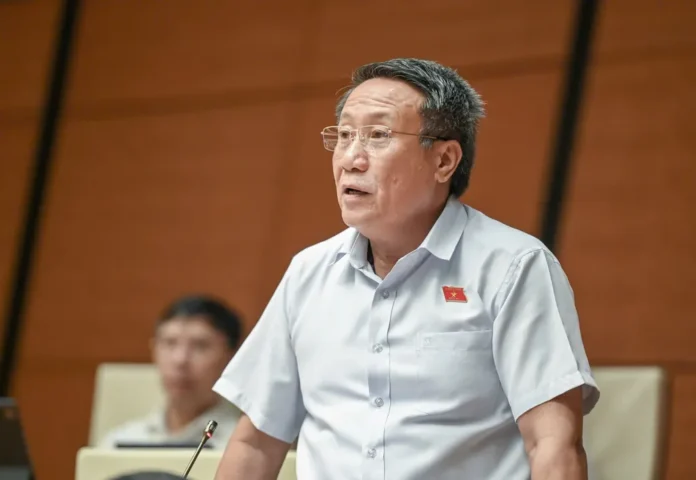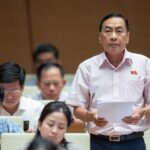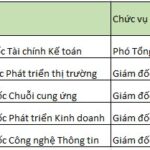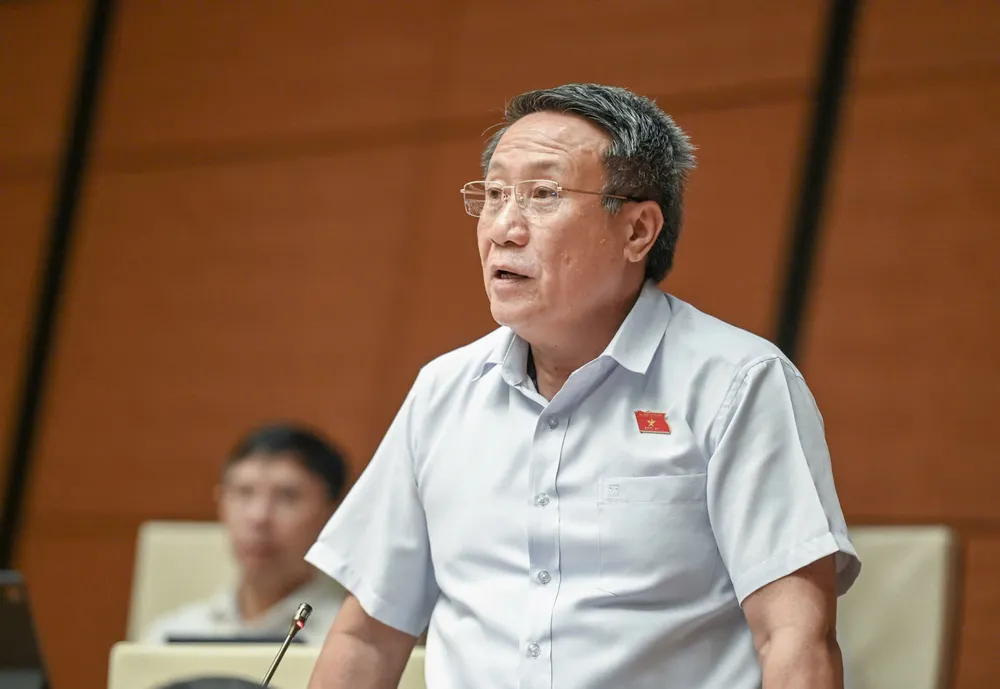
Expanding the scope of eligible entities for business establishment and management
Regarding amendments and supplements on eligible entities for business establishment, participation in management and operations, and employment in enterprises, Deputy Nguyen Thi Thu Dung (Thai Binh) suggested expanding the scope to allow vocational education institutions to establish enterprises for commercializing research results.
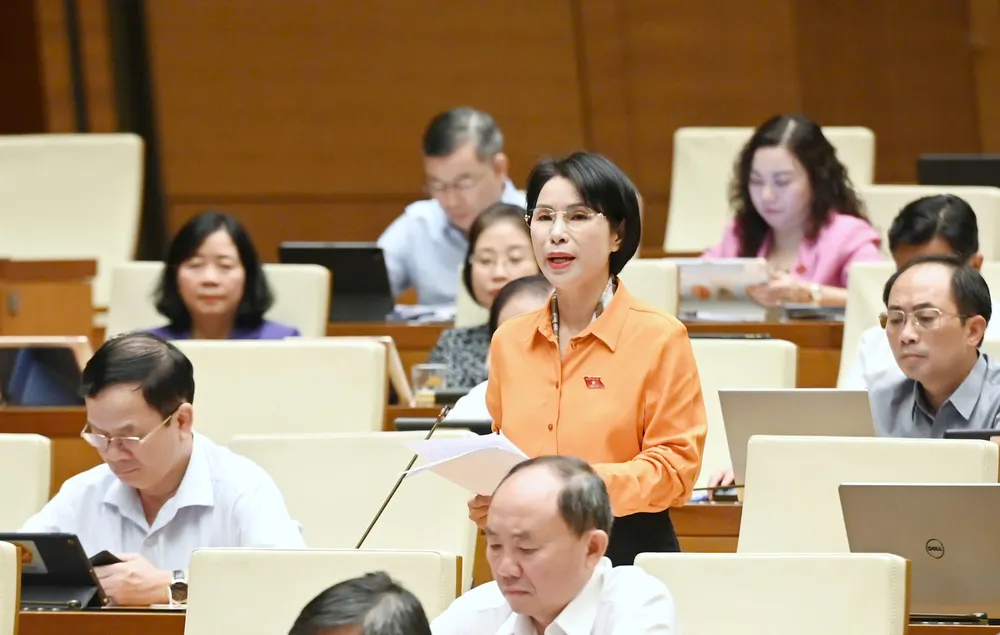
Sharing the same view, Deputy Tran Thi Nhi Ha (Hanoi) appreciated the draft amendment’s expansion of rights for officials at public higher education institutions to contribute capital and manage and operate enterprises for commercializing research results. However, she noted that the draft Law on Science, Technology, and Innovation (also presented at this session) has a broader scope, including officials at all public science and technology organizations, creating inconsistencies in the legal system.
“It should also be noted that not all public higher education institutions are science and technology organizations, and vice versa,” emphasized Deputy Tran Thi Nhi Ha. She proposed that this draft law expand the scope of eligible entities in line with the draft Law on Science, Technology, and Innovation.
While agreeing with the expansion of eligible entities for business establishment, management, and operations, Deputy Pham Van Hoa (Dong Thap) suggested adding stricter provisions to prevent officials from taking advantage of their positions for personal gain in their enterprises.
Unrealistic provisions on beneficial ownership declaration and record-keeping
Regarding the provisions on declaring and storing information about beneficial owners, Deputy Pham Van Hoa suggested distinguishing between large-scale and small-scale enterprises, avoiding unnecessary burdens on small businesses. He considered the requirement for enterprises to retain information about beneficial owners for five years after dissolution or bankruptcy impractical. Instead, he proposed that this responsibility should be assigned to the state agency in charge of business registration.

According to Deputy Ha Sy Dong (Quang Tri), the criteria for determining beneficial ownership are unclear, even though the 2022 Law on Anti-Money Laundering also defines beneficial ownership and mandates the Government to provide detailed guidelines. The Government has issued Decree 19/2023/ND-CP on this issue, applicable to transactions by credit institutions. Deputy Ha Sy Dong learned from consultations with credit institutions that they rely on self-declarations by customers and account holders, lacking verification measures.
“If providing information about beneficial owners to banks is already challenging, requiring enterprises to provide such information to state agencies will be even more difficult,” worried Deputy Ha Sy Dong.
He proposed that, for now, only clearly defined cases (such as direct or indirect ownership of 25% or more of the capital) must be declared. Failure to declare should be subject to penalties. For cases with qualitative criteria (such as “individual with controlling power”), there should also be a requirement to declare, but initially without penalties for incomplete declarations. Later, when the state agency has more comprehensive guidelines on the definition of beneficial ownership, penalties can be introduced for insufficient declarations.
Private bond issuance: Delegating detailed regulations to the Government
Regarding the conditions for enterprises to issue private bonds, the draft amendment adds the requirement that “debt must not exceed five times the owner’s equity.” Deputy Ha Sy Dong (Quang Tri) opined that this issue has been highly controversial during the amendment of the Securities Law in the Law amending nine laws in the financial sector, as well as in the process of drafting the Decree on Private Bond Issuance.
“In the Law amending nine laws in the financial sector, only the Government was assigned to provide detailed regulations instead of setting a fixed rule. I believe this is a reasonable approach because the debt-to-equity ratio depends on various other legal provisions governing private bond issuance,” stated Deputy Ha Sy Dong. “If other provisions on issuance conditions and eligible buyers are stringent, there may be no need to limit the debt ratio or a higher limit can be set,” he added.
Holding a different view, Deputy Bui Thi Quynh Tho (Ha Tinh) commented that specifying a “ceiling” for debt-to-equity ratio in the draft law is necessary. However, through analysis, she suggested that a ratio of 3-4 times is more appropriate.
Siding with Mr. Ha Sy Dong’s perspective, Deputy Nguyen Truong Giang (Dak Nong) analyzed that private bond issuance by enterprises is already subject to strict regulations under securities law. To maximize the effectiveness of this capital mobilization channel, he believed there is no need to include this content in the draft.
Pearl Residence Partners with Savills Vietnam to Elevate the Urban Beach Lifestyle in Cua Lo
Pearl Residence, an exquisite luxury apartment complex in Cua Lo, has recently partnered with Savills Vietnam, a leading global real estate management company. This strategic alliance marks a significant step towards elevating the standard of living and lifestyle experiences for the esteemed residents of Pearl Residence. With Savills’ renowned expertise and comprehensive range of services, the management and operation of this prestigious apartment complex are poised to reach new heights of excellence.
The City’s Revitalization Project: Transforming 4,000 Old Apartments into a New Residential Haven
The Ho Chi Minh City Construction Management and House Development Centre is set to renovate almost 4,000 apartments across the city, according to plans laid out by the People’s Committee of Thu Duc City and relevant districts. This large-scale refurbishment project will provide much-needed relocation accommodations for residents.
Revolutionizing Aviation: A Proposal for Efficient Management of Aeronautical Infrastructure Assets
The Ministry of Finance is seeking feedback on the draft Government Decree on the management, use, and exploitation of aviation infrastructure assets. This decree aims to establish a comprehensive framework for the efficient management and optimization of these critical assets, ensuring their contribution to the country’s economic growth and development. With this decree, we strive to create a sustainable and thriving aviation industry, fostering seamless connectivity and unlocking new opportunities for Vietnam.

